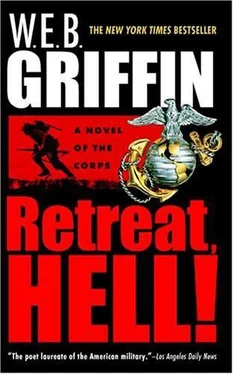The Chinese pulled back to plan, and it was decided then that the primary mission of their Ninth Army Group would be the destruction of the U.S. 1st Marine Division.
Misinterpreting this inactivity of the Chinese—and still grossly underestimating the size of the enemy forces—General of the Army Douglas MacArthur ordered X Corps and Eighth Army to stage attacks designed to, as MacArthur said, "end the war by Christmas."
The attacks didn't.
On Friday, 25 November 1950, preceded by a heavy and lengthy artillery barrage, General Walton Walker's Eighth Army began its march to the Yalu.
Initially, there was very little resistance. But on the night of 25-26 November 1950, the Chinese struck with overwhelming force. By morning, they had broken through Walker's lines, and the Eighth Army's right flank was exposed. The Turkish Brigade was sent to plug the hole, and was virtually destroyed.
By nightfall, Walker had ordered the beginning of what has been called the longest retreat in the history of the U.S. Army: 275 miles in six weeks, during which the Eighth Army suffered 10,000 casualties.
In the east, on 27 November 1950, Major General Edward M. Almond's X Corps—about 100,000 men, including the 1st Marine Division—began to strike for the Yalu.
The 1st Marine Division commander, Major General "Howling Mad" Smith—who openly disliked his orders from Almond and MacArthur but had nevertheless begun to comply with them—positioned about 7,000 Marines to lead the fight.
They were unaware that three Red Chinese divisions, about 30,000 men, were in the mountains on either side of the Yudam-ni Valley, ready to attack, and that the rest of the Chinese Ninth Army Group was moving to cut the main supply route in many places once that attack began.
Nor had they heard about the beating the Eighth Army had taken the day before, and was taking as their attack began.
General Smith's 5th and 7th Marines had some initial success, destroying one Red Chinese division and mauling another. But by the end of the second day, the Chinese plan to chop up the main supply route was also meeting success.
And on the Chosin Reservoir's east shore, the Chinese, in division strength, for all practical purposes wiped out the hopelessly outnumbered 7th Infantry Division's 31st Regimental Combat Team, including a reinforcement by just over a thousand men of the 1st Battalion, 32d Infantry (Task Force Faith, so named for its commander, Lieutenant Colonel Don Carlos Faith).
On 30 November, General Almond ordered General Smith to withdraw, and thus began the thirteen-day retreat in sub-zero temperatures from Yudam-ni to Hungnam, which deservedly has become Marine legend:
To move down the one-lane road, it was first necessary for the Marines to clear the Chinese from the ridges on each side of the valley.
The Marines did so, one ridgeline after another.
Marine Aviation flew close ground support missions whenever the weather permitted.
Marine Artillery provided what support it could.
For nine days, over the thirty miles from Yudam-ni to Chinghung-ni, where the 3d U.S. Army Infantry Division had established a line, the Marines were in constant combat with ten Chinese Communist divisions.
It was during this period that General O. P. Smith was quoted as saying, "Retreat, hell! We're just attacking in another direction!"—although there is some doubt about the attribution.
The first "Retreat, hell!" comment came in France during World War I, when orders were issued for the Marines to retreat. "Retreat, hell! We just got here!" one said. The line was already part of Marine legend by 1950, and somebody certainly must have said it at the Chosin Reservoir.
During this period, too, the legendary Marine Colonel Lewis B. "Chesty" Puller, who was then commanding the 1st Marines, did say something near the Chosin Reservoir about which there is no question:
"Don't you forget that you're 1st Marines! Not all the Communists in hell can overrun you!"
The Marines came out, bringing with them their weapons, their vehicles, their wounded, most of their dead, and a substantial number of Army soldiers they had rescued from certain capture or death.
The 1st Marine Division had suffered 718 Killed in Action, 3,508 Wounded in Action, and 7,313 "noncombat" casualties due to frostbite. There were 192 Marines Missing in Action.
Fourteen Marines were named Medal of Honor recipients. The Marine Corps estimates 25,000 Chinese were killed and another 12,500 were wounded. The U.S. Army estimates there were 30,000 Chinese KIA and another 30,000 Chinese were frostbitten.
On Christmas Eve, 1950, the 1st Marine Division, with the rest of the X United States Corps, was evacuated by sea from Hamhung. X Corps took with it more than 100,000 Korean refugees. The only thing they left for the enemy were some engineering bridge timbers.
On Christmas Eve, 1950, Lieutenant General Walton H. Walker was killed in a jeep accident. Lieutenant General Matthew B. Ridgway was named to replace him.
On 11 April 1951, President Truman sent, through ordinary Army channels, a message to General of the Army Douglas MacArthur, which read:
"I deeply regret that it becomes my duty as President and Commander-in-Chief of the United States Military Forces to replace you as Supreme Commander."
General Ridgway was named to replace him.
After he came home, was promoted, and retired, I had the unique privilege of coming to know Lieutenant General Edward M. Almond and of having him talk to me—usually in his basement office in his home—at length about his role in the Korean campaign, and his relationships with General of the Army Douglas MacArthur and other members of the Supreme Commander's staff.
One day, when I—and if memory serves, my twelve-year old Boy Scout son Bill—arrived for lunch at General Almond's gracious hillside home in Anniston, Alabama, he met me at the door and handed me a letter he said he had just received.
General Almond was then well into his seventies, but his eyes were still a brilliant blue, and when I looked at him, I thought I saw the beginnings of tears.
The letter was on Marine Corps General Officer's stationery. There were three red stars at the top.
The letter was from Lieutenant General Lewis B. Puller, USMC.
It began:
MY DEAR GENERAL ALMOND,
ON THE OCCASION OF MY RETIREMENT FROM THE UNITED STATES MARINE CORPS, I FELT DUTY BOUND TO WRITE TO YOU TO TELL YOU THAT YOU WERE THE FINEST COMBAT COMMANDER UNDER WHOM I WAS EVER PRIVILEGED TO SERVE.
There was more to the letter, now long forgotten, but I shall never forget those opening lines, or General Almond's reaction to them.
W. E. B. Griffin
Pilar, Buenos Aires Province, Argentina
6 August 2003












